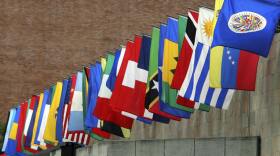
Shereen Marisol Meraji
Shereen Marisol Meraji is the co-host and senior producer of NPR's Code Switch podcast. She didn't grow up listening to public radio in the back seat of her parent's car. She grew up in a Puerto Rican and Iranian home where no one spoke in hushed tones, and where the rhythms and cadences of life inspired her story pitches and storytelling style. She's an award-winning journalist and founding member of the pre-eminent podcast about race and identity in America, NPR's Code Switch. When she's not telling stories that help us better understand the people we share this planet with, she's dancing salsa, baking brownies or kicking around a soccer ball.
-
After the attacks on the World Trade Center on September 11, 2001, the word "terrorism" was everywhere. It's a powerful term that's had lasting implications for communities around the world.
-
New research shows "Latinx" hasn't really caught on among U.S. adults in that heritage group: While one in four have heard of the term, only 3% use it.
-
By the 1980s, fewer than 50 Hawaiians under age 18 could speak their language. A handful of second-language speakers took it upon themselves to start a school where everything is taught in Hawaiian.
-
We talked to Angela Saini, author of the new book Superior: The Return of Race Science, about how race isn't real (but you know ... still is) and how race science crept its way into the 21st century.
-
NPR's Code Switch podcast looks at race and identity in America. In this episode, NPR's Shereen Marisol Meraji and Gene Demby talk about transracial adoption.
-
Describing groups of people as animals, using language like, "hunt them down" and "infestation" is an age old tactic to influence public opinion. And, it works. History shows when dehumanizing language is repeated, people start seeing their fellow human beings as sub-human.
-
A poll asked: When you were growing up, were you encouraged to apply to college, discouraged from applying or was this never discussed?
-
As Hispanic Heritage Month gets under way, it's worth noting that the idea of people from the Latin American diaspora referring to themselves as 'Hispanic' or 'Latino' or 'Latinx' is a fairly new one.
-
People often remember tensions between African-Americans, white police officers and Korean business owners. That story gets more complicated when you step into a predominantly Latino neighborhood.
-
For the first time, four black directors are among the nominees in the best documentary feature category. Three of them made films that deal explicitly with race and race relations in America.




